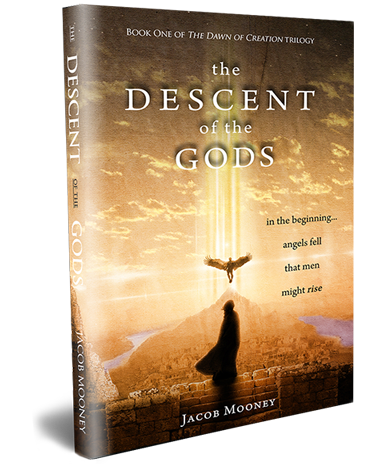
Source: Antiquities of the Jews – Book 1, Chapter
Genesis 6:1–4 is one of the Bible’s most mysterious and hotly debated passages. It speaks of a time when the “sons of God” saw that the “daughters of men” were beautiful and took them as wives. The result was the birth of the Nephilim—giant warriors remembered as “mighty men of old, men of renown.”
But who exactly were these “sons of God”? And how did ancient Jewish readers understand the story?
One of the clearest voices from history is Flavius Josephus, a Jewish priest, scholar, and historian who lived in the first century AD.
Writing around 93 AD, Josephus describes the Genesis 6 account in Antiquities of the Jews, affirming that the “sons of God” were angels. He presents this view not as controversial but as the standard interpretation of his time.
Josephus on the Sons of God
Here’s how Josephus retells the story in Antiquities:
“For many angels of God accompanied with women, and begat sons that proved unjust, and despisers of all that was good, on account of the confidence they had in their own strength; for the tradition is, that these men did what resembled the acts of those whom the Grecians call giants.”
This brief statement does several important things:
- It affirms the angelic identity of the “sons of God,” a view supported by earlier Jewish writers like Philo and widely held in the Second Temple period.
- It connects the Nephilim to Greek mythology, noting that their deeds resembled those of the legendary giants in Greco-Roman stories.
- It frames this as common tradition, not fringe speculation. According to Josephus, this was simply what people believed.
Genesis 6 and the Angelic View
Genesis 6:1–4 says:
“When man began to multiply on the face of the land and daughters were born to them, the sons of God saw that the daughters of man were attractive. And they took as their wives any they chose… The Nephilim were on the earth in those days, and also afterward, when the sons of God came in to the daughters of man and they bore children to them.”
The debate centers on who the “sons of God” were. The three main views are:
- Angelic view: They were supernatural beings—angels—who sinned by taking human wives. This is the oldest known interpretation, supported by ancient Jews and early Christians.
- Sethite view: Popularized by Augustine around 400 AD, this says the “sons of God” were the descendants of Seth, marrying ungodly Cainite women.
- Demonic possession or earthly rulers: Modern attempts to explain the supernatural elements away while still preserving the oddness of the text.
Josephus clearly holds to the first view: angels sinned by physically joining with human women, producing giant offspring.
Myths and Memory: Josephus and Greek Giants
Josephus makes another fascinating move. He connects the Nephilim not just to Jewish tradition, but to Greek mythology. He writes:
“…for the tradition is, that these men did what resembled the acts of those whom the Grecians call giants.”
This line echoes what other Jewish writers of the period were doing—claiming that the true origin of the world’s myths lay in corrupted memories of real events. Hesiod’s Theogony, for example, tells of the union of heaven (Uranus) and earth (Gaia), which produced titanic offspring. These beings rebelled and were eventually cast into Tartarus, a dark prison deep below the earth—exactly where Peter and Jude say the sinful angels were imprisoned (2 Peter 2:4, Jude 6).
Philo of Alexandria made a similar connection, claiming the biblical giants were born of angels and women, and that this was the true story behind pagan legends of heroes and demigods.
A Familiar Story in the First Century
Josephus’ account tells us something crucial: in the time of Christ and the early church, the angelic interpretation of Genesis 6 was mainstream. There is no sign in his writing that the Sethite view even existed. In fact, the Sethite interpretation didn’t gain traction until three centuries later, when Augustine found the idea of angelic-human offspring too strange to accept.
But in Josephus’ day, the Jewish world knew of the story and accepted its supernatural elements. As your own research has pointed out, by the first century, this reading was reinforced by Second Temple literature like the Book of Enoch and affirmed by early Christian writers such as Justin Martyr, Irenaeus, and Tertullian.
Translator’s Note: “The Constant Opinion of Antiquity”
William Whiston, who translated Antiquities in 1737, adds this comment at the mention of angels:
“This notion, that the fallen angels were, in some sense, the fathers of the old giants, was the constant opinion of antiquity.”
This is a helpful reminder that modern readers are often surprised by ideas that were completely ordinary to the early church and ancient Jews.
Why Josephus Still Matters Today
Josephus isn’t Scripture. But his writings help us see how the ancient world understood Scripture. His version of Genesis 6:
- Supports the angelic view of the sons of God
- Links the Nephilim to global myths of giants and demigods
- Confirms that this interpretation was uncontroversial in the first century
When pastors or students ask, “Isn’t that just a fringe theory?”—Josephus reminds us that, no, it wasn’t. It was the default view for centuries.
Why this matters
Josephus gives us more than a commentary—he gives us a glimpse into how Genesis 6 was read before the rise of allegory and rationalism. By restoring this context, we gain a clearer view of what the Bible is saying and how its earliest readers heard it.
Today, as interest in the Nephilim and ancient giants grows—alongside a flood of misinformation—we need grounded, historical resources to guide our understanding.
This site exists to help separate fact from fiction, rooted in Scripture and supported by solid sources like Josephus.






